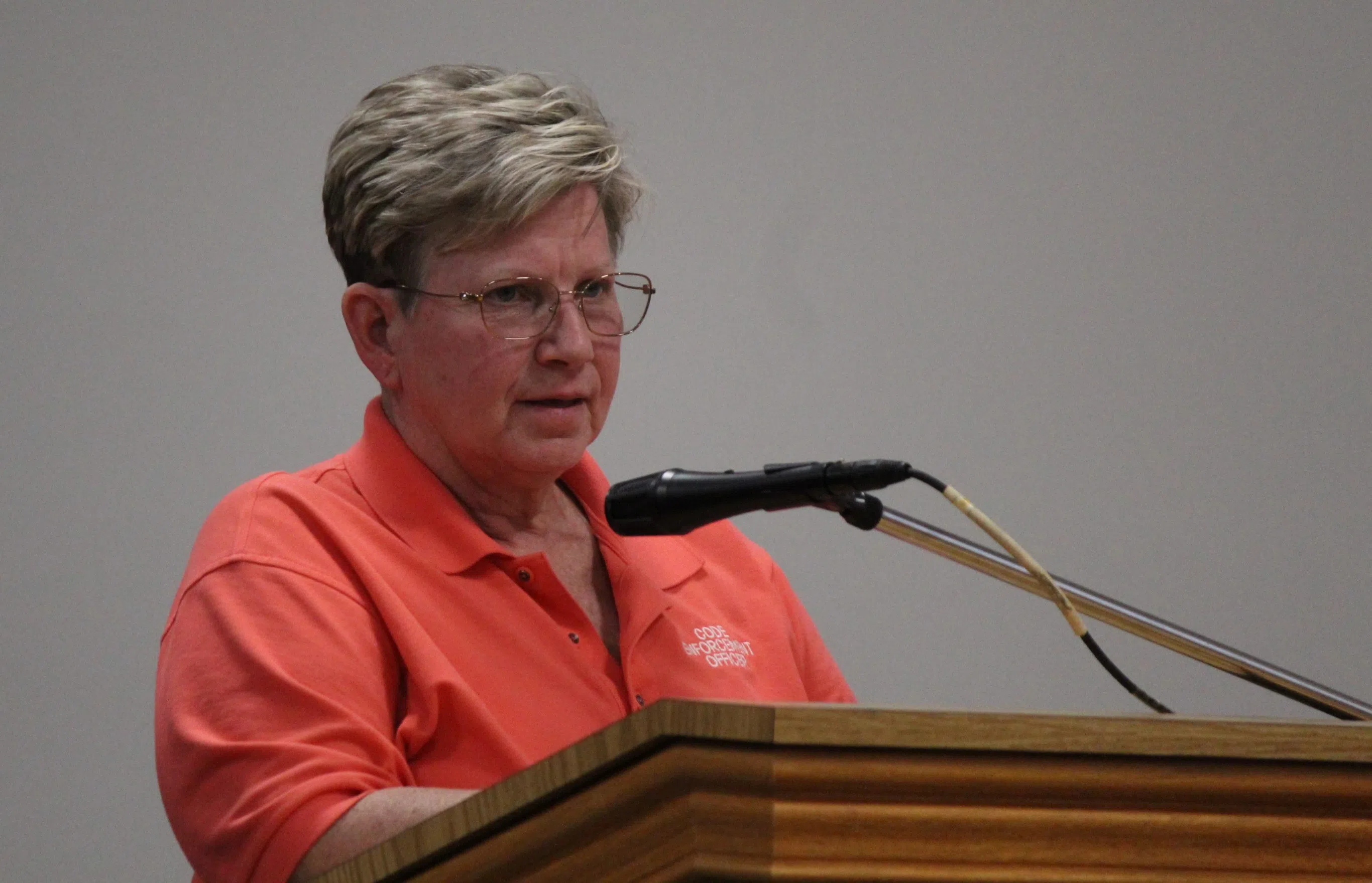BY MELINDA J. OVERSTREET
FOR GLASGOW NEWS 1
Enforcing the city’s codes, i.e. rules, regarding property maintenance and appearance “protects the health safety and welfare of our citizens by preventing blight in our neighborhoods,” said Sheryl Peña, Glasgow’s code enforcement officer as she began her annual report to the city council on Monday.
She added that it makes Glasgow a great place to be to raise families and work productively.
She said her objective is to get compliance with the codes by exposing violations such as substandard structures, improper or open storage, dumped tires and overgrown grass.
Projected on the walls during her presentation various “slides” illustrating some of the things with which she deals while doing her job. One such slide showed four stages of a house – a “before” shot, a shot of a burned-out shell, an empty lot and a new home.
“This here is an example of what code enforcement can do for our city,” Peña said.
She had had to condemn the property, and it was finally demolished, but then a developer purchased the property and built a new house on it and sold it.
She pointed out that the excess tires and mosquitoes that had been on the BR Tire property were removed because of code-enforcement efforts.
When there is a complaint, it is checked by an officer and if it is found to be valid, the owner is notified of the violation. If no one is present at the property a door hanger and/or brochure is left there to inform them of the issue. A reinspection is done after a specified time, and approximately half of the time, the issues have fixed by that point, Peña said.
If the problem has not been resolved, additional notifications and/or citations and fines are issued.
Citations may be appealed to a five-member board appointed for the purpose of considering those.
The board meets monthly as needed.
If the nuisance is still not abated, the city can file a lien against the property for costs incurred for having work done there, e.g. if the city has to pay someone to mow the grass, and in the worst-case scenarios, structures may be demolished.
“This (fiscal) year, I’ve had a total of 512 cases,” with 94 still active.
Peña has documented a total of 1,398 activities, with each return trip or other step taken constituting an activity, she said. A total of 302 notices of violations have been issued and 88 citations, “because they refused to do anything.”
She said the city has had nine demolitions so far this year.
In 47 percent of the cases, the complaint has come from a neighbor, and 53 percent are from the officer, “because once I go to that neighborhood and see a complaint, and I turn around and look and there’s three other complaints in the neighborhood. They want to know why I’m fussing at them and not everybody else in the neighborhood.”
Among those 512 cases, 92 of those places were occupied by the owner, 204 were renter occupied and 35 were businesses. Eighty-two were vacant houses and another 99 were vacant lots, Peña said.
“There are a lot of vacant houses and vacant lots in Glasgow,” she said.
The city has received $3,346.60 this fiscal year from residents for mowing, cleanups and boarding up structures the city had done, Peña said, and $2,176 was received in lien fees and certified mail reimbursements. For fines on unmaintained properties, $3,250 was received, and $1,532.17 in revenue from interest on liens of long standing, she said, for a grand total of $14,458.77 returned to the city’s General Fund. In addition, the city received $4,154 as payment for the rehabilitated property.
Expenses sometimes include a demolition, but she said the city hasn’t had to pay for any of the demolitions done in this fiscal year. Other expenses include $2,260 for cleanup, boarding and brush removal at eight properties and $4,590 for mowing roughly 12 to 15 properties she calls her “zombie houses” every two weeks. These are typically places where the owner moved away and/or died – sometimes decades ago – and they have no forwarding address and no local heirs, so she has to try to track down someone who can be responsible or initiate the process for a foreclosure for potential demolition.
Mayor Henry Royse said at the conclusion of Peña’s report that when someone gets one of those door hangers or brochures, the first thing they tend to want to do is call the mayor’s office about it, and he said his response is almost always that she’s just doing her job.
“The need is there, and it really is making a difference …,” he said. “I really appreciate the job that you do.”
The separate Glasgow News 1 report on the rest of the council meeting is at this link.

Sheryl Peña, Glasgow's code enforcement officer, speaks at Monday's regular meeting of the Glasgow Common Council. MELINDA J. OVERSTREET / FOR GLASGOW NEWS 1
Glasgow code enforcement officer shares update with city council
May 23, 2023 | 6:50 PM
Comments